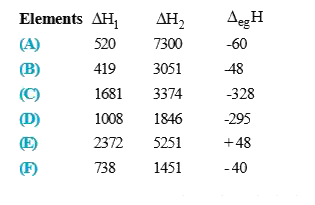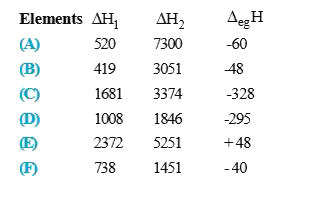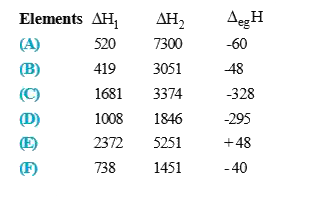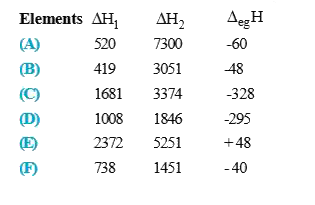Explain the terms ionization enthalpy and electron gain enthalpy.
Step-by-Step Solution:
Step 1: Define Ionization Enthalpy
- Ionization enthalpy (or ionization energy) is defined as the amount of energy required to remove an electron from the outermost shell of an isolated gaseous atom. This process results in the formation of a positively charged ion (cation).
Step 2: Explain the Process of Ionization
- When an atom in the gaseous state loses an electron, it undergoes ionization. For example, if we take a generic atom "A" in the gaseous state, the ionization process can be represented as:
A(g)→A+(g)+e−
The energy required to carry out this process is known as the ionization enthalpy.
Step 3: Define Electron Gain Enthalpy
- Electron gain enthalpy (or electron affinity) is the amount of energy released or absorbed when an electron is added to an isolated gaseous atom. This process can lead to the formation of a negatively charged ion (anion).
Step 4: Explain the Process of Electron Gain
- When an atom in the gaseous state gains an electron, it undergoes electron gain. For example, if we take the same generic atom "A", the electron gain process can be represented as:
A(g)+e−→A−(g)
The energy change associated with this process is known as the electron gain enthalpy. Depending on the atom, this process can either release energy (exothermic) or require energy (endothermic).
Step 5: Distinguish Between the Two Concepts
- Ionization enthalpy and electron gain enthalpy are opposite processes. Ionization involves the removal of an electron, while electron gain involves the addition of an electron. The stability of the atom and its electronic configuration can influence whether energy is released or absorbed during these processes.
- Ionization enthalpy (or ionization energy) is defined as the amount of energy required to remove an electron from the outermost shell of an isolated gaseous atom. This process results in the formation of a positively charged ion (cation).
- When an atom in the gaseous state loses an electron, it undergoes ionization. For example, if we take a generic atom "A" in the gaseous state, the ionization process can be represented as:
A(g)→A+(g)+e−
The energy required to carry out this process is known as the ionization enthalpy.
- Electron gain enthalpy (or electron affinity) is the amount of energy released or absorbed when an electron is added to an isolated gaseous atom. This process can lead to the formation of a negatively charged ion (anion).
- When an atom in the gaseous state gains an electron, it undergoes electron gain. For example, if we take the same generic atom "A", the electron gain process can be represented as:
A(g)+e−→A−(g)
The energy change associated with this process is known as the electron gain enthalpy. Depending on the atom, this process can either release energy (exothermic) or require energy (endothermic).
- Ionization enthalpy and electron gain enthalpy are opposite processes. Ionization involves the removal of an electron, while electron gain involves the addition of an electron. The stability of the atom and its electronic configuration can influence whether energy is released or absorbed during these processes.
Topper's Solved these Questions
- CLASSIFICATION OF ELEMENTS AND PERIODICITY IN PROPERTIES BOOK - MODERN PUBLICATIONCHAPTER - CLASSIFICATION OF ELEMENTS AND PERIODICITY IN PROPERTIES EXERCISE - REVISION EXERCISE (LONG SHORT ANSWER QUESTIONS)
9 Videos
- CLASSIFICATION OF ELEMENTS AND PERIODICITY IN PROPERTIES BOOK - MODERN PUBLICATIONCHAPTER - CLASSIFICATION OF ELEMENTS AND PERIODICITY IN PROPERTIES EXERCISE - COMPETITION FILE (OBJECTIVE TYPE QUESTIONS (A)) (MCQs)
21 Videos
- CLASSIFICATION OF ELEMENTS AND PERIODICITY IN PROPERTIES BOOK - MODERN PUBLICATIONCHAPTER - CLASSIFICATION OF ELEMENTS AND PERIODICITY IN PROPERTIES EXERCISE - REVISION EXERCISE (VERY SHORT ANSWER QUESTIONS )
18 Videos
- CHEMICAL BONDING AND MOLECULAR STRUCTUREBOOK - MODERN PUBLICATIONCHAPTER - CHEMICAL BONDING AND MOLECULAR STRUCTUREEXERCISE - UNIT PRACTICE TEST
13 Videos
- ENVIRONMENTAL POLLUTION BOOK - MODERN PUBLICATIONCHAPTER - ENVIRONMENTAL POLLUTION EXERCISE - UNIT PRACTICE TEST
15 Videos
Similar Questions
What is the significance of the terms-'isolated gaseous atom' and 'ground state' while defining the ionisation enthalpy and electron gain enthalpy?
Hint: Requirements for comparison purposes.
View SolutionIn terms of ionization enthalpy and electron gain enthaply , what type of atoms combine to form an
ionic compound ?
View Solution
Knowledge Check
Second electron gain enthalpy:
Ais always negativeBis always positiveCcan be positive or negativeDis always zeroThe first and second ionization enthalpies and electron gain enthalpy of some elements are as given below:

Which of these elements is the most reactive metal?A(A)B(B)C(F)D(D)The first and second ionization enthalpies and electron gain enthalpy of some elements are as given below:

Which of the elements given above is the least reactive?A(C)B(D)C(E)D(F)
What is the significance of the terms-'isolated gaseous atom' and 'ground state' while difining the ionisation enthalpy and electron gain enthalpy?
Hint: Requirements for comparison puroses.
View SolutionWhat do you understand by the terms
(i) Ionization enthalpy
(ii) Electron gain enthalpy?
View SolutionMatch the correct ionisation enthalpies and electron gain enthalpies of the following elements.

View SolutionThe first and second ionization enthalpies and electron gain enthalpy of some elements are as given below:

Which of these elements is the most reactive non-metal?
View SolutionThe first and second ionization enthalpies and electron gain enthalpy of some elements are as given below:

Which of these elements is the least reactive non-metal?
View Solution
